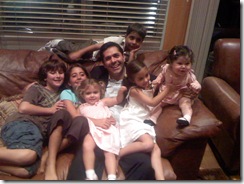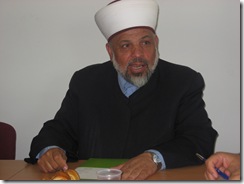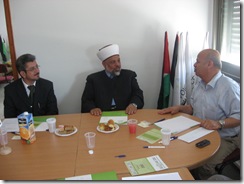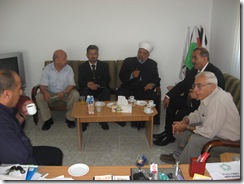Iranian Government Now Trying to Intimidate Mexican Art Community
Published under Art, Iran, Media and Alternative Media, Mexico, Religion Dec 08, 2007For those that can read Spanish, below is an excerpt from an article by Leo Zuckerman, an excellent Mexican columnist (who happens to be married to the smart cousin in the family ![]() .
.
For those that can’t read Spanish, just a quick synopsis: The Iranian regime is not content with suppressing their own people, or blowing up embassies and community centers in Argentina or trying to procure nuclear weapons, or trying to be a spoiler to efforts by the Palestinian and Israeli Heads of State to achieve a peace agreement.
Now they are also trying to impose their censure on artists exhibiting art in Mexican Museums. They began bullying an artist and museum threatening to issue fatwas against them if they do not bring down a display. The art at stake by a Moroccan artist is a homage to French painter Gustave Coubert and is based on photographs of human vaginas covered by a contour that resembles a temple. The Iranian Ambassador was incensed at this and began threatening everyone he could.
At issue is not whether you or I like the art at sake – I have never seen it. But whether a retrograde regime that imposes censure on its own people, persecuting homosexuals and lashing out against women who don’t wear a hijab or banning all sorts of open behavior or jailing people that disagree with their views – should have the gull to seek to impose their views on the citizens of Mexico also!!!
I think there is great validity to the view that artists should exercise their judgment and be sensitive to certain core tenets of religions. The Danish cartoons that infringed on the Islamic ban of portraying the Great Prophet Muhammad (let alone doing so in an offensive fashion) in my opinion were exceedingly insensitive to a noble religion and it is very regrettable that such bad judgment was displayed by those who organized a "contest" about this.
But the answer is not to use or threaten violence, and it is also certainly not to censure all forms of expression that may offend precisely because artists some times need to be able to express themselves against the injustice or inhumanity of a status quo condition, government or religion and, while it is very sad when people feel they need to offend others, it is far more harmful to prevent all forms of expression that offend those in power.
Now to add insult to injury the Iranian Ambassador seeks to impose his censure in a peace-loving and modest country thousands of miles away from his.
Excélsior / Juegos de Poder
Aquí no, señor embajador
Leo Zuckermann / Martes 27 de noviembre del 2007
Gracias a una oportuna y completa nota de Juan Pablo Proal en Proceso me enteré de que el embajador de Irán en México está exigiendo el retiro de una exposición artística en Puebla. La historia es la siguiente. En la capital poblana se está exhibiendo la obra El origen del mundo del artista marroquí Fouad Bellamine. En ella hay una serie de fotografías de vaginas humanas cubiertas por un contorno que asemeja una mezquita. De acuerdo al autor, la obra es un homenaje al pintor francés Gustave Coubert que en el siglo XIX mostró una vagina desnuda que fue censurada: “Con ese antecedente, el marroquí intentó también hacer una deferencia estética a la vagina por ser una fuente de vida, explica la curadora”.
El embajador Mohammad Hassan Chadiri Abyahen fue invitado a la inauguración del Festival Internacional de Puebla y visitó la exhibición. En cuanto la vio, se indignó, consideró las obras como “superpornográficas” y exigió que fueran inmediatamente retiradas. El artista le explicó que el símbolo de la mezquita al frente de las vaginas “era meramente espiritual y podría interpretarse como una Iglesia católica o judía”. Pero el iraní se enojó más y le reclamó que no tenía derecho a ofender a ninguna religión. Al parecer, la Secretaría de Cultura de Puebla, con la anuencia del artista, decidió desmontar la exhibición de inmediato, lo cual, por fortuna, no ocurrió. Fue entonces que el embajador iraní mandó una carta que vale la pena citar:
“Mientras el mundo musulmán está lleno de auténticos artistas representantes de su propia cultura, invitar a un maniático, vulgar e ignorante y a pesar de todo llamarlo artista a presentar la cultura y arte del mundo musulmán, resulta muy extraño.
“Usar este tipo de fotografías pornográficas, no tiene nada que ver con la cultura y el arte del mundo islámico, fotografías que pueden representar una parte vulgar de algunos ambientes, muy corruptos de algún país del mundo occidental. Una exposición que no es posible exhibirlo en ningún país islámico.
“El autor debería explicar al Mundo del Islam la razón de su acto ofensivo. Es natural que el mundo islámico no existe tolerancia, acerca de insultar a los asuntos Sagrados, por esto es mejor que no se repita esta situación, y es lógico y humano respetar el credo religioso de otros”.
La misiva, además de mal redactada, amenazó con “boletinar” a Bellamine como “enemigo del Islam”. Y ya se sabe qué significa esto como lo ha atestiguado el escritor Salman Rushdie quien ha tenido que vivir prácticamente en la clandestinidad.
La embajada iraní sigue presionando para que se retire la exhibición. Dice estar dispuesta a una crisis diplomática con México. Sería un grave error que el gobierno de Mario Marín e incluso el federal de Felipe Calderón accedieran a las demandas de Chadiri Abyahen. México es un país occidental donde constitucionalmente está protegido el derecho a la libertad de expresión. Si a los religiosos les disgusta este tipo de exhibiciones, pues que no vayan a verla.
Eso es muy diferente a ordenar la censura como efectivamente sucede en los países islámicos. En este sentido, el embajador iraní es un buen representante de su nación donde se piensa que el Estado, dominado por los ayatolás, debe ser intolerante con los “asuntos Sagrados” y decidir qué sí y qué no puede ver la gente. Pero aquí, señor embajador, las cosas son diferentes. En México los artistas tienen el derecho de exhibir sus obras, aunque sean una basura, lo cual lo decide cada quien de acuerdo a su criterio personal.
Irán es un país fundamentalista que, como este caso demuestra, pretende exportar sus creencias. Qué peligroso que estos religiosos intolerantes estén a punto de tener armas nucleares.



















